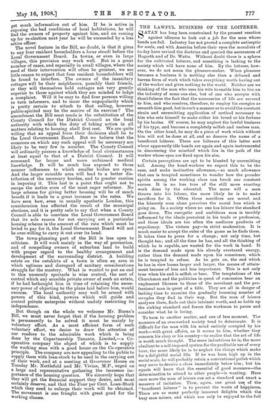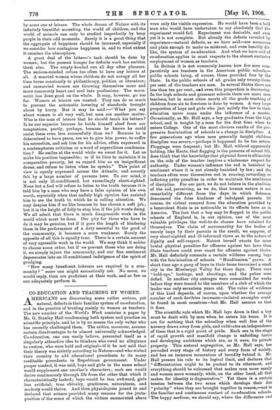THE LAWFUL BUSINESS OF THE LOITERER.
SATAN has long been constrained by the present reaction against idleness to look out a job for the man whose hands are full. Industry has not proved a complete antiseptic for souls, and with America before their eyes the moralists of to-day have revised the doctrine and queried the assurances of Hogarth and of Dr. Watts. Without doubt there is a sphere for the cultivated loiterer, and something is lacking to the society which will have none of him. By the loiterer, hovi- ever, we do not mean the pleasure-seeker. When pleasure becomes a business it is nothing else than a debased and barren form of work which takes everything worth having out of the worker and gives nothing to the world. Neither are we thinking of the man who uses his wits to enable him to live on the industry of some one else, but of one who accepts with thankfulness the fact that the necessaries of life are secured to him, and who resolves, therefore, to employ his energies as seemeth him good, but in such a manner as to avoid the constant strain and unremitting application of method necessary to him who sets himself to make either his bread or his fortune by his brains. Of course, he may neglect the lawful business of his type, and become a completely selfish and useless man. On the other hand, be may do a piece of work which without him will not be done at all, and so deserve the name of a beneficent loiterer. There are loiterers of this latter sort whose apparently idle hands are again and again instrumental in discovering the mischief which lies in the path of the worker whose eyes are fixed upon his aim.
Certain perceptions are apt to be blunted by unremitting toil. Among the hand-workers we expect this to be the case, and make instinctive allowance,—so much allowance that one is tempted sometimes to wonder how the prouder spirits among the working class can brook our constant excuse. It is no less true of the still more exacting work done by the educated. The more will a man throws into his labour, the more likely he is to make sacrifices for it. Often these sacrifices are moral, and the leisurely man alone perceives the moral loss which is going on. In a society where no one has leisure the standard goes down. The energetic and ambitious man is terribly influenced by the ideals prevalent in his trade or profession, and those ideals are too often the mediocre products of expediency. The virtues pay—in strict moderation. It is much easier to accept the rules of the game as he finds them. It takes time to press for a change ; not only time, but thought too; and all the time he has, and all the thinking of which he is capable, are wanted for the work in hand. It is the demand made upon his already overtaxed energy, rather than the demand made upon his conscience, which he is tempted to refuse. As be gets on, the end which he has in view looms larger and larger, the means of attain- ment become of less and less importance. This is not only true when his end is selfish or base. The temptations of the Churchman and the politician in quest of concession bear an unpleasant likeness to those of the merchant and the pro- fessional man in quest of a title. They are all in danger of lacking time to examine the gradually lessening number of scruples they find in their way. But the man of leisure analyses them, finds out their intrinsic worth, and so holds up the sinking standard and forces the workman to pause and consider what he is losing.
To turn to another matter, and one of less moment. The manners of an overworked society tend to deteriorate. It is difficult for the man with his mind entirely occupied by his work,with great affairs, as it seems to him, whether they concern his shop or his country—to realise that the art of life is worth much thought. The more industrious he is, the more obedient to a self-imposed system for the profitable use of every hour, the more likely be is to neglect the things which make for a delightful social life. If he was born high up in the social scale, he will probably retain a conventional polish which may serve to deceive a class immediately below him ; but his equals will know that the essential' of good manners—the determination to attend to other people—is wanting. Here once more the man of leisure can set a standard and exact a measure of imitation. Then, again, one great use of the "beneficent loiterer" is to prevent the waste of happiness. There are so many perfectly innocent delights which the busy man misses, and which can only be enjoyed to the full by some one at leisure. The whole drama of Nature with its infinitely beautiful mounting. the world of children, and the world of animals can only be studied imperfectly by busy people in their odd moments. Surely it is a great thing that the aggregate of happiness should be increased, especially if we consider how contagious happiness is, and to what extent it ozonises the atmosphere.
A great deal of the loiterer's task should be done by women; but the present hunger for definite work has smitten then.). also. The empty-beaded run all day after pleasure. The serious-minded refuse too often to have any leisure at all. A married woman whose children do not occupy all her time turns constantly to philanthropy, politics, or literature; and unmarried women are throwing themselves more and more commonly heart and soul into professions. The move- ment has done good on the whole. It may, however, go too far. Women at leisure are wanted. They can do so much to prevent the automatic lowering of standards brought about by burry. But it may be said :—" What you say about women is all very well, but men are another matter. Who is the man of leisure that he should teach his betters ? Is be our superior because be holds himself aloof from our temptations, partly, perhaps, because he knows he could .resist them even less successfully than we ? Because he is determined to have peace, are we to give him power, to suffer -his correction, and ask him for his advice, often expressed in a contemptuous criticism or a word of supercilious condemna- tion ? He smiles at the world while we sweat for it. Let us make his position impossible ; or if he likes to maintain it in comparative poverty, let us regard him as an insignificant drone, and refuse to listen when he speaks." This point of view is openly expressed across the Atlantic, and secretly felt by a large number of persons here. To our mind, it is not only ill-conditioned, but exceedingly short-sighted. None but a fool will refuse to listen to the truth because it is told him by a man who may have a false opinion of his own worth, especially when that unduly high opinion has assisted him to see the truth to which he is calling attention. We may despise him if we like because he has chosen a soft job; but it is the height of folly to stop him if the job wants doing. We all admit that there is much disagreeable work in the world which must be done. Our pity for those who have to do it may be genuine, but if it goes the length of hindering them in the performance of a duty essential to the good of the community, it becomes a mere weakness. Surely the opposite of all this is equally true. There is a certain amount of very agreeable work in the world. We may think it nobler to choose some other, but if we prevent those who are doing it, we simply injure the community, and our fine sentiment degenerates into an ill-conditioned indulgence of the spirit of grudging.
" How many beneficent loiterers are required in a com- munity ? " some, one might sarcastically ask. No more, we would reply, than are proficient at their work, and as few as can adequately perform it.















































 Previous page
Previous page